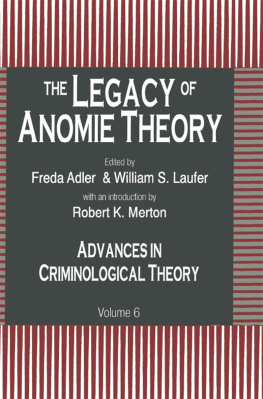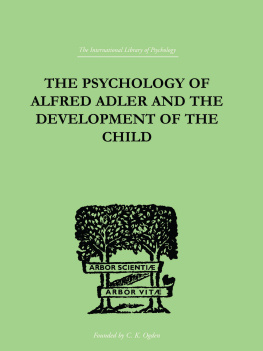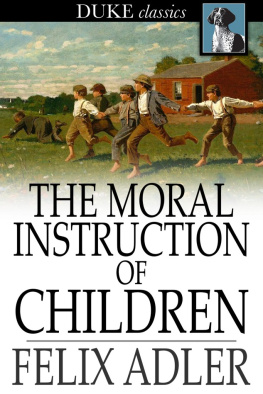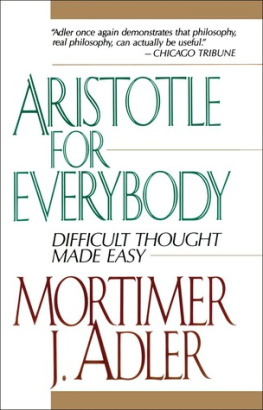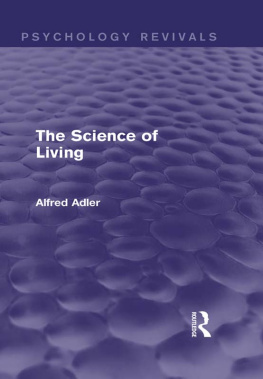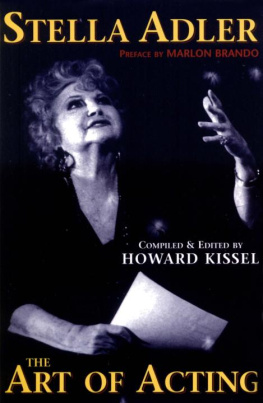THE LEGACY OF ANOMIE THEORY
EDITORS
Freda Adler
Rutgers University
William S. Laufer
University of Pennsylvania
EDITORIAL BOARD
Kenneth Adams
Sam Houston University
Celesta Albonetti
Texas A&M University
James Byrne
University of Lowell
Albert K. Cohen
University of Connecticut
Simon Dinitz
Ohio State University
Delbert Elliott
University of Colorado
Hans Eysenck
University of London
James O. Finckenauer
Rutgers University
Daniel Georges-Abeyie
Florida State University
John J. Gibbs
Indiana University (PA)
Don Gottfredson
Rutgers University
Stephen D. Gottfredson
Indiana University
Kate Hanrahan
Indiana University (PA)
Patricia Harris
University of Texas
Nicholas N. Kittrie
American University
Pietro Marongiu
University of Cagliari
Joan McCord
Temple University
Gerhard O. W. Mueller
Rutgers University
Joan Petersilia
University of California;
Rand Corporation
Marc Riedel
Southern Illinois University
Diana C. Robertson
University of Pennsylvania
Robin Robinson
Rutgers University
Kip Schlegel
Indiana University
Steven D. Walt
University of San Diego
David Weisburd
Rutgers University
Elmar Weitekamp
University of Tbingen
Marvin Wolfgang
University of Pennsylvania
EDITORIAL ASSISTANT, VOLUME 6
Deborah Walker
Rutgers University
CONSULTING EDITORS
Wanda Foglia
University of Pennsylvania
Jane Siegel
University of Pennsylvania
THE LEGACY OF ANOMIE THEORY
Edited by
Freda Adler & William S. Laufer
with an introduction by
Robert K. Merton
ADVANCES IN CRIMINOLOGICAL THEORY
Volume 6
First published 1995 by Transaction Publishers
Published 2019 by Routledge
2 Park Square, Milton Park, Abingdon, Oxon, OX14 4RN
52 Vanderbilt Avenue, New York, NY 10017
Routledge is an imprint of the Taylor & Francis Group, an informa business
Copyright 1995 by Taylor & Francis.
All rights reserved. No part of this book may be reprinted or reproduced or utilised in any form or by any electronic, mechanical, or other means, now known or hereafter invented, including photocopying and recording, or in any information storage or retrieval system, without permission in writing from the publishers.
Notice:
Product or corporate names may be trademarks or registered trademarks, and are used only for identification and explanation without intent to infringe.
ISBN 13: 978-0-7658-0662-8 (pbk)
ISBN 13: 978-1-138-53655-5 (hbk)
ISSN: 0894-2366
To Robert K. Merton,
living legend
Contents
Robert K. Merton
Thomas J. Bernard
Nikos Passas
Robert Agnew
Gary F. Jensen
Richard Rosenfeld and Steven F. Messner
Deborah Vidaver Cohen
Elin Waring, David Weisburd, and Ellen Chayet
Ko-lin Chin and Jeffrey Fagan
John P. Hoffmann and Timothy Ireland
Freda Adler
Sir Leon Radzinowicz
David F. Greenberg
S. George Vincentnathan
Bonnie Berry
Michael J. Lynch and W. Byron Groves
C. Ray Jeffery
Gilbert Geis
The contributions to the first five volumes of Advances in Criminological Theory have generated lively discussion and comment. These comments themselves are contributing to the advance of criminological theory. There are two comments in this volume. The editors invite others to contribute their reflections on issues raised by the contributions to this series. Comments need not be in article form. Brief notes are equally welcome.

Robert K. Merton
for James S. Coleman my onetime student, longtime colleague, enduring friend and teacher
Writing in her capacity as editor of Advances in Criminological Theory, Freda Adler reminds me that Social Structure and Anomie (SS&A) appeared more than half a century ago. And, she went on to say, Volume 6 of Advances would consist largely of papers focused on the tradition of sociological and criminological thought to which it and my further elucidating papers on SS&A have given rise. Hence, the invitation to have me do an introduction. She made it clear from the start that this would not call for a dialogue with what I soon found to be a wide array of pointed critical commentaries and nicely constructive extensions of that theoretical tradition in this volume. Instead, it would call for reflections on the paradigm of SS&A as it evolved over its early decades. That obliged me to warn that such an assignment will exact a considerable price from the reader, for suitable documentation of even the early phases of that still ongoing theoretical development would entail a relentless series of references to my own work and a good number of quotations from it and from commentaries on it; worse still, a detailed biography of the paradigm would surely include a good many footnoted asides as well.
At that point, coincidence took over. For it happens that I have long been intermittently at work on a paper with the provisional title Opportunity Structures: A Brief Biography of the Concept1a paper that, as the years move on, promises (or threatens) to develop into a rather more differentiated monograph with the current working title, Opportunity Structure: On the Emergence, Diffusion, and Differentiation of a Social Science Concept, 1930s- 1990s. That comparatively extensive work is a specimen case study of a developing concept examined from the theoretical framework of the historical sociology of scientific knowledge. The present, mercifully shorter conceptual reprise, in the form of a retrospective confined to its first three decades, draws heavily on that work-in-exceedingly-slow-progress and on previously unpublished correspondence as well as on earlier publications in print and on oral publications in the form of lectures, seminars, workshops and kindred arrangements.2
The inclusion of oral publications, which in the nature of the form are often ephemeral, is in this instance essential, since the successive publications of the evolving paradigm of SS&A in print were invariably preceded by extensive discussions in lectures and seminars. As I have observed elsewhere in some detail, such direct interaction among teachers, students, and colleagues makes for cognitive micro-environments in which new ideas emerge and develop.3 And, as we shall see in the case of SS&A, it also leads to primary diffusion and development of those ideas in the local micro-environments as distinct from their secondary diffusion and manifold elucidation in the cognitive macro-environment that occur after publication in print. (I resist the temptation to advance conjectures about the patterns of intellectual diffusion that follow from the rapidly increasing use of E-mail and electronic publication.)4



